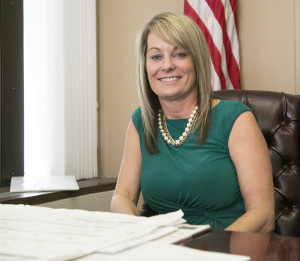Superintendent of Public Instruction Sherri Ybarra is vowing to fight for public schools funding in the face of potential competition for state financial resources.
Early this month, Ybarra called for increasing K-12 education funding by 7.5 percent, or $110 million, during the 2016-17 school year.
Fast-forward to last week, when lawmakers at a Treasure Valley chambers of commerce forum suggested the Legislature would make a strong push in 2016 for significant tax cuts.
Between a potential move to cut taxes, wildfire expenses, transportation infrastructure projects already placed on the table, prisons expenses and health and welfare costs, state budget-writers may again face a delicate financial balancing act.
During a lengthy interview Wednesday morning, Ybarra pledged to do all she could for educators who still haven’t seen school budgets return to pre-recession levels.
“That is what people have hired me to do is always fight for education,” Ybarra said. “I do represent the people, and over and over again people support education in Idaho.”
Ybarra stressed that she built her budget around state revenue projections — which were revised upward over the summer. Ybarra stressed her budget was constructed so that Idahoans would not wind up playing tug-of-war between paying for schools or cutting taxes.
“We don’t have to worry about that,” Ybarra said. “Most legislators want to do the right thing, and the education department… will guide them that way.”
During Wednesday’s interview Ybarra also deconstructed her budget and the philosophies that went into crafting the spending proposal.
Reversing budget cuts
If approved, Ybarra’s budget would increase the amount of per-classroom discretionary spending (sometimes called operations funding) to $25,696 — the same level as in 2009. After the 2009 budget year, the funding source was reduced sharply in response to the Great Recession. For the current year, per-classroom funding is set at $23,868, so Ybarra is seeking an increase of $1,828 per classroom.
“The thing we knew we needed to work on… the No. 1 request I heard from stakeholders around the state, was increasing discretionary funding back to the Governor’s Task Force recommendation comparable to 2009 levels,” Ybarra said.
Mastery-based education

Ybarra’s budget also touches other Task Force recommendations, including mastery-based education. Ybarra called for spending $1.2 million in state funding next year to help develop that program. On Wednesday, Ybarra warned that a move to mastery “could get messy” and would be “a generational shift” that likely won’t be fully implemented during her current four-year term. She would make the money available to any district wishing to pursue mastery, though she would not push any school leaders to go down that path until they are ready.
Ybarra defined mastery as a move away from the traditional method of advancing students through school based on “seat time” in favor of an individualized education that allows students to work at their own pace until they master subject material.
“It’s based on what you are learning, what those concepts are,” Ybarra said. “Basically students in fourth grade may actually be working on sixth grade math. It’s a way to accelerate students and is not based on a set time (in one classroom).”
Such a move could require major changes in transportation and schools funding, which is why Ybarra described it as a generational shift.
Ybarra also hinted that Idaho may need to revamp its funding formula, saying early discussions about a per-pupil expenditure based school funding system are taking place.
Rural schools initiative
Ybarra would also create a new rural schools incubator, and called for the state to spend $300,000 next year to help launch such a program. Eventually, Ybarra envisions a series of regional rural centers throughout the state that would partner with the State Department of Education to help rural districts address their needs through cooperation and shared resources.
“Idaho is over 70 percent rural, and we have to start recognizing that as we talk about teacher shortages and the funding formula,” Ybarra said.
A spreadsheet detailing Ybarra’s 2016-17 budget proposal is available by clicking the highlighted text in this sentence.
Although the 2016-17 school budget won’t be set until the end of the 2016 legislative session, leaders of two prominent groups, the Idaho Education Association and Idaho Association of School Administrators, offered support for Ybarra’s proposal.

Since then, Madison Superintendent Geoffrey Thomas, Idaho’s reigning superintendent of the year, also threw his support behind Ybarra’s budget proposal.
“In recent years, the school budget has just been devastated through the recession and legislative cuts,” Thomas said. “Restoring it to where we were is a real positive thing.”
Thomas also said he “appreciated Mrs. Ybarra putting together a budget in which she worked with the governor’s office and included everybody.”
Moving forward, look for two key events that are likely to shape the evolution of the school budget. On Jan. 11, Gov. Butch Otter will present his budget recommendation. After that, Ybarra will deliver a financial presentation to the Legislature’s budget committee. The date of Ybarra’s presentation is likely to take place in January.
